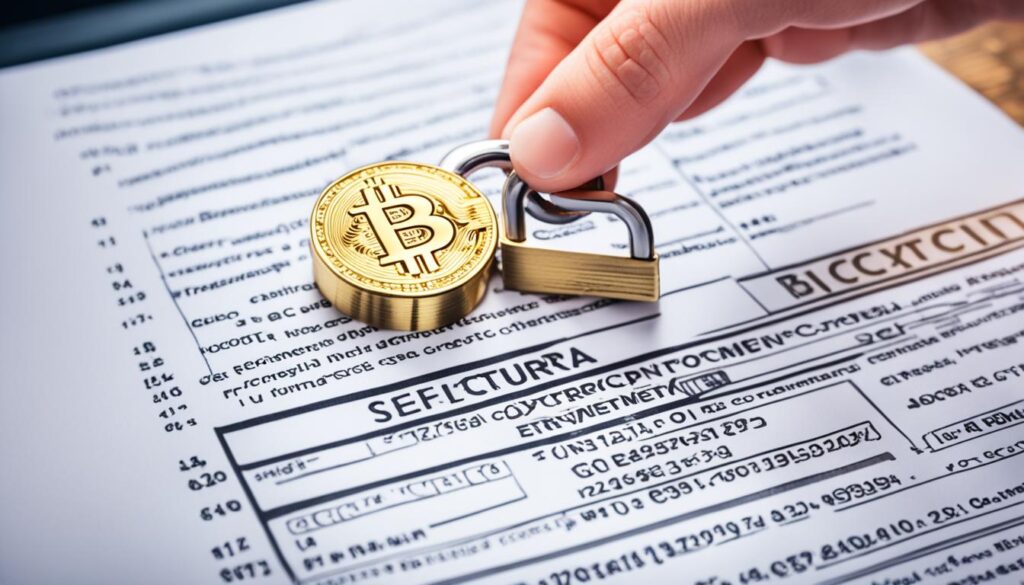Are you prepared to discover fresh possibilities for expanding your retirement savings? Picture utilizing the opportunities offered by the thriving cryptocurrency market to safeguard your financial future. Through an Ethereum IRA, you have the option to invest in the second-largest cryptocurrency globally and potentially reap significant profits. So, how can you go about investing in Ethereum for retirement? Let’s delve into the realm of cryptocurrency retirement accounts and explore the available options.
Key Takeaways:
- An Ethereum IRA allows you to invest in Ethereum, the second-largest cryptocurrency, using your retirement funds.
- Choose a licensed and regulated IRA company that offers cryptocurrency investment options.
- Fund your crypto-compatible IRA through contributions, transfers, or rollovers from your existing retirement accounts.
- Once your IRA is funded, you can start buying and holding Ethereum or other cryptocurrencies.
- Consider the risks associated with investing in cryptocurrency, such as market volatility and regulatory changes.
How to Choose an IRA That Allows Crypto
When considering investing in cryptocurrencies through an IRA, it’s essential to choose the right type of account that enables you to buy and hold digital assets. A self-directed IRA is an excellent option for those seeking more control over their investments. With a self-directed IRA, you have the flexibility to choose what assets are included in your portfolio, including cryptocurrencies like Ethereum and Bitcoin.
There are several reputable crypto IRA companies available in the market today. Some notable examples are BitcoinIRA, iTrustCapital, CoinIRA, BitIRA, and Equity Trust. These companies assist individuals in setting up self-directed IRAs that allow for investment in cryptocurrencies. However, it’s crucial to vet any crypto IRA provider to ensure their legitimacy and compliance with regulations. That way, you can protect yourself from potential scams and fraudulent schemes.
Adding to the options, Fidelity Investments launched its Digital Assets Account in 2022 for investors interested in including digital assets, including cryptocurrency, in their 401(k) retirement plans. This development showcases the growing demand and recognition of the cryptocurrency market within traditional financial institutions.
When choosing an IRA that allows crypto, consider the following factors:
- Regulation and Compliance: Ensure that the IRA company adheres to regulatory standards and is licensed to operate in the cryptocurrency market. This step helps to safeguard your investments and mitigate potential risks.
- Custodial Services: Evaluate the custodial services provided by the IRA company. A secure and reliable custody solution is crucial for protecting your cryptocurrency holdings.
- User Experience: Assess the user experience of the IRA platform. Look for a user-friendly interface and intuitive tools that make it convenient to manage your crypto investments.
- Customer Support: Look for an IRA provider that offers responsive and knowledgeable customer support to address any queries or concerns you may have.
- Fees: Consider the fees associated with the IRA. Take note of account setup fees, transaction fees, storage fees, and any other charges that may affect the overall profitability of your investment.
By carefully evaluating these factors, you can select an IRA that aligns with your investment goals and provides a secure and trusted platform for buying and holding cryptocurrencies.
| Company | Key Features | Fees |
|---|---|---|
| BitcoinIRA | Access to a wide range of cryptocurrencies, including Ethereum, Bitcoin, and Litecoin | Setup fee + annual maintenance fee |
| iTrustCapital | Investment in cryptocurrencies and precious metals within a self-directed IRA | Flat monthly fee |
| CoinIRA | Expert guidance and a variety of crypto investment options | Varies depending on the investment |
| BitIRA | Secure digital wallet and access to a diverse portfolio of cryptocurrencies | Setup fee + annual storage fee |
| Equity Trust | Wide selection of investment options, including cryptocurrencies | Varies depending on the investment |
These examples represent a range of crypto IRA providers, each with its own unique features and fee structures. It’s important to evaluate and compare these offerings to find the one that best suits your investment needs.
Remember to consult with a financial advisor or retirement planning professional before making any investment decisions. They can provide personalized guidance based on your individual circumstances and help you navigate the complexities of investing in cryptocurrencies through an IRA.
Quote:
“A self-directed IRA offers individuals the ability to take control of their retirement investments, including the option to invest in cryptocurrencies. By carefully selecting a reputable IRA provider, investors can benefit from the potential growth of cryptocurrencies while adhering to regulatory requirements.” – Financial Advisor

Continue reading to learn more about funding your crypto-compatible IRA.
Funding Your Crypto-Compatible IRA
When it comes to funding your cryptocurrency IRA, you have multiple options available. Whether you want to contribute to your account in the traditional sense or transfer existing retirement savings, there are strategies to suit your needs and goals.
1. Contribute to Your IRA
You can fund your crypto-compatible IRA by making contributions in the usual way. This can be done through cash deposits, checks, or direct deposits, allowing you to allocate funds to your retirement savings on a regular basis. Make sure to check the maximum allowable contribution limit per year to fully maximize the benefits of your IRA.
2. Rollover Employer-Sponsored Plans
If you have an employer-sponsored retirement plan, such as a 401(k) or 403(b), you can roll over those funds into a crypto-friendly Rollover IRA. By doing so, you can maintain the tax-deferred status of your savings and have the flexibility to invest in cryptocurrencies for your retirement. This option allows you to consolidate your retirement funds and take advantage of the potential growth in the crypto market.
3. Transfer Your Existing Retirement Account
If you already have a traditional IRA or other retirement account, you can transfer those funds into an IRA that accepts cryptocurrencies. This process enables you to keep your retirement savings intact while gaining exposure to digital assets like Ethereum. By transferring your existing retirement account, you can align your investment strategy with the potential growth of cryptocurrencies.
Remember, regardless of the funding method you choose, it’s crucial to work with a reputable IRA provider that specializes in cryptocurrency investments. This ensures the security of your funds and compliance with relevant regulations.
Now that you understand how to fund your crypto-compatible IRA, you can take the necessary steps to start building your retirement savings in Ethereum and other cryptocurrencies.

| Funding Options | Description |
|---|---|
| Contribute to Your IRA | Fund your crypto-compatible IRA through cash deposits, checks, or direct deposits up to the maximum allowable amount per year. |
| Rollover Employer-Sponsored Plans | Transfer funds from your employer-sponsored retirement plan into a crypto-friendly Rollover IRA to maintain tax-deferred status and invest in cryptocurrencies. |
| Transfer Your Existing Retirement Account | Consolidate your retirement savings by transferring funds from your existing retirement account into an IRA that accepts cryptocurrencies. |
Buying Crypto with Your IRA
Once your account is funded, you can start buying cryptocurrency using your IRA. It’s a convenient way to diversify your retirement funds and take advantage of the potential growth in the crypto market. However, there are important factors to consider before making your crypto purchases.
Transaction fees:
When buying and selling cryptocurrency, you need to be aware of transaction fees associated with trading as well as blockchain and exchange fees. These fees can vary depending on the platform you use. It’s essential to research and compare fees to ensure you are getting the best deal for your investments.
IRA company fees:
In addition to transaction fees, your IRA company may charge certain fees for managing your account. These fees can include annual fees, trading fees, or key storage fees. It’s important to understand and account for these fees as they can impact the overall performance of your IRA.
Risks:
Investing in cryptocurrencies carries risks, and it’s crucial to be aware of them. These risks include regulatory risk, as the crypto market is subject to changing regulations and government interventions. There is also insurance risk, as cryptocurrencies are not typically insured by traditional financial institutions. Market risk is another consideration, as cryptocurrency prices can be highly volatile and subject to sudden fluctuations. Lastly, there is fraud risk, with cases of scams and fraudulent activities prevalent in the crypto space. It’s important to conduct thorough research and understand these risks before making any investment decisions.
It’s essential to thoroughly research and understand the risks associated with investing in cryptocurrencies before using your IRA funds.”
It’s always recommended to consult with a financial advisor or retirement planner who specializes in cryptocurrency investments. They can provide guidance tailored to your individual situation and help you make informed decisions.
| Benefits | Risks |
|---|---|
| Diversification of retirement portfolio | Regulatory risk |
| Potential for growth in digital assets | Insurance risk |
| Tax-deferred gains | Market risk |
| Fraud risk |
Considerations
When utilizing your IRA to buy crypto, it’s important to consider your overall investment strategy and risk tolerance. Keep in mind that the value of cryptocurrencies can fluctuate significantly, and it’s important to be prepared for potential losses. Additionally, as with any investment, it’s crucial to stay informed about the latest trends, news, and regulations in the crypto market.
Lastly, ensure that you are complying with all IRS regulations and guidelines when investing in cryptocurrencies with your IRA. This includes keeping accurate records of your transactions and reporting them appropriately on your tax returns.

Risks of Using Cryptocurrency for Retirement
Investing in cryptocurrencies through a retirement account like a Crypto IRA can offer potential opportunities for growth and diversification. However, it is important to consider the risks involved before committing your retirement savings to this volatile asset class.
Regulatory Risk
Cryptocurrencies are still a relatively new investment, and regulatory frameworks around the world are continuously evolving. Changes in government regulations can impact the accessibility, taxation, and legal status of cryptocurrencies, affecting their value and the ability to use them for retirement planning.
Insurance Risk
Unlike traditional financial assets, cryptocurrencies are not insured by institutions like the Securities Investor Protection Corporation (SIPC) or the Federal Deposit Insurance Corporation (FDIC). This means that if your cryptocurrency is stolen or lost due to hacking or other security breaches, there may be limited protection or recourse available to recover your funds.
Market Risk
Cryptocurrency markets are highly volatile, with prices capable of experiencing significant fluctuations in short periods. This volatility can lead to rapid gains, but also substantial losses. When investing in cryptocurrencies for retirement, it is crucial to consider your risk tolerance and the potential impact of market volatility on your long-term financial goals.
Fraud Risk
The crypto space is not immune to fraudulent activities. Scams, Ponzi schemes, and phishing attacks are prevalent, with individuals or groups trying to exploit unsuspecting investors. It is important to remain vigilant and carefully evaluate any investment opportunities or platforms offering crypto-related retirement products.
Considering these risks, it is essential to assess whether investing in cryptocurrency aligns with your risk tolerance, long-term retirement goals, and investment strategy. Consult with a qualified financial advisor to understand the potential benefits and pitfalls of including cryptocurrencies in your retirement portfolio.

Can You Buy Crypto with a Roth IRA?
While it is possible to hold cryptocurrency in a Roth IRA, directly contributing it is not permitted. According to the Internal Revenue Service (IRS), cryptocurrency is classified as property for tax purposes. This means that you can add cryptocurrency to your Roth IRA by purchasing it rather than contributing it directly. However, it’s worth noting that only a few traditional Roth IRA providers allow you to hold cryptocurrency within your account.
If you’re looking for an alternative to traditional Roth IRAs that enables you to invest in cryptocurrencies for your retirement, consider a Bitcoin IRA. A Bitcoin IRA gives you the opportunity to include cryptocurrencies in your retirement portfolio, taking advantage of the potential benefits and growth that digital assets offer.

Investing in Crypto with a Roth IRA
The option to hold cryptocurrency within a Roth IRA can provide tax advantages and potential diversification for your retirement savings. However, due to its relatively new and dynamic nature, cryptocurrency is not widely supported by traditional Roth IRA providers. To pursue cryptocurrency investments within a tax-advantaged retirement account, a Bitcoin IRA or other specialized providers may be a more suitable choice.
Risks and Considerations of Holding Crypto in a Roth IRA
Holding crypto in a Roth IRA can provide opportunities for portfolio diversification, but it’s essential to understand the risks involved. Cryptocurrency is notorious for its extreme volatility, which may not be suitable for individuals who are nearing retirement or those who have low tolerance for significant fluctuations in their investments.
The value of cryptocurrencies can fluctuate greatly within short periods, and sudden price drops can result in substantial losses. It’s important to carefully consider your risk tolerance and evaluate whether you can withstand such volatility before deciding to include crypto in your Roth IRA.
Furthermore, it’s crucial to be aware that fees for crypto IRAs are typically higher compared to traditional IRAs. Cryptocurrency transactions often involve trading and blockchain fees, which can accumulate over time and impact the overall value of your investment. When selecting a provider for your Roth IRA, it’s essential to compare and assess the fees associated with crypto IRAs to ensure they align with your financial goals.
By considering the risks and fees, investors can make well-informed decisions regarding holding crypto in a Roth IRA. It’s advisable to consult with a financial advisor or retirement planner who can provide personalized guidance based on your unique circumstances and objectives.
“Cryptocurrency is known for its extreme volatility, which may not be suitable for individuals approaching retirement or those who cannot tolerate significant fluctuations in their investments.”
To gain a better understanding of the potential risks and fees associated with holding crypto in a Roth IRA, let’s take a closer look at a comparison table:
| Consideration | Risks of Holding Crypto in a Roth IRA | Volatility of Crypto | Fees for Crypto IRA |
|---|---|---|---|
| Definition | The potential risks and downsides of including cryptocurrency in a Roth IRA. | The tendency of cryptocurrencies to experience significant price fluctuations. | The fees incurred when utilizing a crypto-compatible Roth IRA for investing in cryptocurrencies. |
| Impact | May result in potential financial losses due to extreme price volatility. | Can lead to significant gains or losses within short time frames. | Could affect the overall value of the investment and potential tax advantages. |
| Potential Concerns | Limited suitability for individuals nearing retirement or with low risk tolerance. | Increased vulnerability to sudden market fluctuations and price drops. | Higher fees compared to traditional IRA options, which may impact long-term returns. |
| Consideration | Evaluate risk tolerance and financial ability to handle extreme crypto volatility. | Understand the potential for significant price movements and associated risks. | Compare and assess fees of various crypto-friendly Roth IRA providers. |

It’s crucial to thoroughly evaluate the risks and fees associated with holding crypto in a Roth IRA before making any investment decisions. Only by conducting comprehensive research and seeking advice from financial professionals can you make an informed choice that aligns with your financial goals and risk tolerance.
The Benefits of a Self-Directed IRA for Crypto
A self-directed individual retirement account (IRA) offers a unique opportunity to diversify your retirement portfolio by investing in alternative assets, including cryptocurrencies. By incorporating crypto into your self-directed IRA, you can potentially benefit from the growth of digital assets while ensuring the security of your investments.
Investing in crypto through a self-directed IRA allows you to broaden your investment portfolio beyond traditional options, such as stocks and bonds. This diversification can help mitigate the risks associated with relying solely on traditional investments.
With a self-directed IRA, your crypto investments are securely stored in a digital wallet, offering peace of mind and protection against theft or loss. This ensures that your retirement savings are safeguarded while you take advantage of the potential growth opportunities presented by the cryptocurrency market.
One of the key advantages of a self-directed IRA for crypto is the ability to defer taxes on your investment gains until you make withdrawals. This tax-deferred status allows your investments to grow unhindered, potentially maximizing your returns over time.
Additionally, a self-directed IRA gives you greater control over your retirement savings. You have the freedom to choose the cryptocurrencies and digital assets that align with your investment goals and risk tolerance. This level of control empowers you to make informed investment decisions based on your own research and market analysis.
“Investing in cryptocurrencies through a self-directed IRA provides a unique opportunity to diversify your retirement portfolio and potentially benefit from the growth of digital assets.”
However, it’s important to consider the risks associated with investing in crypto. The cryptocurrency market is highly volatile, and prices can experience significant fluctuations. It’s crucial to carefully assess your risk tolerance and investment objectives before allocating a portion of your retirement savings to cryptocurrencies.
Advantages of Self-Directed IRAs for Crypto:
- Diversify your retirement portfolio beyond traditional assets
- Potential for growth in the cryptocurrency market
- Secure storage of your crypto investments in a digital wallet
- Tax-deferred status on investment gains
- Greater control over your retirement savings
By carefully considering the benefits and risks, a self-directed IRA can be a valuable tool to diversify your retirement portfolio and potentially capitalize on the growth of cryptocurrencies. If you’re interested in exploring this investment option further, it’s essential to work with a reputable custodian that specializes in providing custodial services for alternative assets, such as cryptocurrencies.

Finding a Custodian for Your Crypto IRA
When considering a custodian for your crypto IRA, there are a few key factors to keep in mind. These include fees, security measures, customer support, and the range of available assets for investment.
Trusted Custodian
It’s crucial to choose a trusted custodian for your crypto IRA. Look for a reputable company like Accuplan that specializes in providing custodial services for alternative assets, including cryptocurrencies. A trusted custodian will ensure the safety and security of your investments.
Fees
Another important consideration is the fees associated with your crypto IRA. Compare the fees charged by different custodians to ensure you’re getting the best value for your money. Accuplan offers competitive fees, allowing you to maximize your investment returns.
Security Measures
Security should be a top priority when selecting a custodian for your crypto IRA. Accuplan employs robust security measures to protect your digital assets, such as encryption and multi-factor authentication. This ensures that your investments are safe from cyber threats and unauthorized access.
Customer Support
Crypto investments can be complex, so having reliable customer support is essential. Accuplan offers 24/7 customer support, allowing you to get assistance whenever you need it. Their knowledgeable team can answer your questions and provide guidance throughout the investment process.
By choosing a trusted custodian like Accuplan, you can have peace of mind knowing that your crypto IRA is in good hands. With competitive fees, robust security measures, and exceptional customer support, Accuplan is a reliable choice for your cryptocurrency investments.

Conclusion
Investing in cryptocurrencies through an IRA can provide you with an opportunity to diversify your retirement portfolio. It allows you to allocate a portion of your funds to digital assets like Bitcoin and Ethereum, potentially benefiting from their growth. However, it’s important to understand that crypto IRAs come with certain risks.
Volatility is one of the key risks associated with cryptocurrencies. The value of digital assets can fluctuate significantly, which may not be suitable for individuals who are nearing retirement or those with a low risk tolerance. Additionally, fees for crypto IRAs are typically higher than traditional IRAs, so it’s crucial to consider the impact they may have on your potential tax advantages.
Before deciding to invest in a crypto IRA, carefully evaluate your risk tolerance, long-term investment goals, and the ever-changing regulatory landscape. It’s advisable to consult with a reputable retirement planner or financial advisor who can provide you with personalized guidance tailored to your financial circumstances and retirement planning needs.
By considering the relevant factors and seeking professional advice, you can make an informed decision about whether a crypto IRA is the right choice for you. Remember to weigh the potential benefits against the risks and ensure that your investment aligns with your overall retirement strategy.











